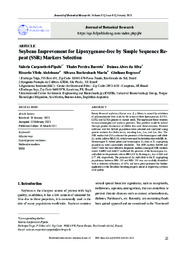Soybean improvement for lipoxygenase-free by simple sequence repeat (SSR) markers selection.
Soybean improvement for lipoxygenase-free by simple sequence repeat (SSR) markers selection.
Author(s): CARPENTIERI-PIPOLO, V.; BARRETO, T. P.; SILVA, D. A. da; ABDELNOOR, R. V.; MARIN, S. R. R.; DEGRASSI, G.
Summary: Beany flavor of soybean (Glycine max (L.) Merr.) is caused by oxidation of polyunsaturated fatty acids by the action of three lipoxygenases (LOX1, LOX2 and LOX3) present in mature seeds. The unpleasant flavor restricts human consumption of soybean products. This problem could be solved through genetic elimination of alleles that code these enzymes. Parental cultivars and two hybrid population were selected and analyzed using genetic markers for alleles locus, encoding Lox1, Lox2 and Lox3 free. The SSR marker Satt212 confirmed the presence of the homozygous null-allele Lx3 in the cultivar BRS 213, which were used for hybridization with BR 36. Heterozygote F1 hybrid plants and homozygous Lx3 lines in F2 segregating populations were successfully identified. The SSR markers Sat090 and Sat417 were the most effective diagnostic markers among all SSR markers tested. Satt090 and Satt417 confirmed the presence of the homozygous Lx2 null-allele in the parental cultivar BRS 213 by flanking Lx2 loci at 3,00 and 2,77 cM, respectively. The presence of Lx2 null allele in the F2 segregating populations between BRS 213 and BRS 155 were successfully identified with a selection efficiency of 98% and have great potential for further application in the Brazilian breeding program aimed at improving soybean seed quality. Index terms: Glycine max, lipoxygenase isozymes, molecular markers, MAS
Publication year: 2021
Types of publication: Journal article
Unit: Embrapa Wheat
Observation
Some of Embrapa's publications are published as ePub files. To read them, use or download one of the following free software options to your computer or mobile device. Android: Google Play Books; IOS: iBooks; Windows and Linux: Calibre.
Access other publications
Access the Agricultural Research Database (BDPA) to consult Embrapa's full library collection and records.
Visit Embrapa Bookstore to purchase books and other publications sold by Embrapa.

